Dewey 21C: November 2008 Archives

It was pretty simple: principals didn't have the money nor inclination to hire certified arts teachers. Instead, they looked to utilizing existing staff for the teaching of the arts. At the primary levels that means classroom teachers, or common branch teachers ("CB's"). In the middle and secondary levels that means subject area teachers.
When the dollars could be found, schools enhanced the work of these teachers in the arts with services of teaching artists and cultural organizations, including field trips, professional development, provision of instructional materials (study guides, lesson plans, etc.), and teaching artist residencies. Perhaps we will see more done via technology, a virtual approach to the provision of services.
A economic growth cycle is generally accompanied by increases in the number of certified arts teachers, as well as the services of cultural organizations. Periods of growth will often see an emphasis on the teaching of the arts as a discrete discipline, including the development of curricula emphasizing this approach.
Flat budgets see little or no growth in arts specialists, but may continue to see increased demand for the services of arts organizations, as the organizations help to underwrite their work in the schools.
A downward cycle with cuts to the school budget, has historically seen a reduction in the number of certified arts teachers, and depending on the severity of the downturn, may also see significant cutbacks to the budget for external services, as well as cuts from funders supporting such work. Periods such as these will see a tilt towards the integration of the arts across the curriculum. As James Carville said in 1995: "it's the economy stupid."
Every district is different. In New York City, there is a no layoff provision in current teacher contract. This doesn't mean that a school can't excess a position, it can, but the salary will continued to be paid through a flexible formula where the school and the central bureaucracy share the cost of that position. Part-time positions can be cut with much greater ease.
As always, meta-level education policies will color all of this. The continued approach to standardized testing in reading and math could act as a major accelerant to the downward cycle of cutting certified arts teachers, supplies, and external services. It's also possible that the downward cycle will change the game in ways we cannot necessarily predict, such as principals finding ways around the present accountability movement, as well as district officials backing off during difficult financial times.
Does anyone have a crystal ball?

It's the silver bullet theory. In this case, it's the incontrovertible piece of research that will flip the switch.

The silver bullet theory has been at play in the movements: small schools, charter schools, vouchers, accountability, etc.
Okay, here's Diane Ravitch taking on the silver bullet theory that the Gates Foundation bought into for a cool $2 billion. That not a typo. Yup, $2 billion.
Click her to read Diane Ravitch in Forbes.com on Bill Gates And His Silver Bullet
With state budget deficits growing, what happened here may be worth noting carefully, very carefully.
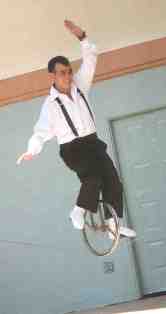
It raises the question of exactly how prepared we all are to advocate during a period of budget reductions. In this instance, had the New York State Legislature had a different make-up in terms of the Senate majority, we might have seen a harsh and unfair cut to the NYSCA budget occur on a mid-year basis with barely a week for the arts community to mobilize.
My observation is that the NYSCA constituency was scrambling to address this matter. I believe that we will all need to become much more organized and coordinated, in local communities across the country, in order to provide an adequate and appropriate voice as expected cutbacks are announced, debated, and implemented.
Another interesting observation is that NYSCA's importance varies greatly depending on the size of your budget. For larger institutions, the NYSCA grant is relatively small and may not necessarily get the wheels turning in response. Mid-sized and smaller organizations depend much more heavily on funds from the New York State Council, but don't have the same clout, don't often retain lobbyists, and haven't carved out capacity in the area of advocacy.
Add to this, that many organizations had already received their grants in panels held before October and December, and as I understand it, a large part of the remaining grants which would have been zeroed out were to arts education, it further illustrates the need to connect the dots of the various arts disciplines, size organizations, etc. In other words, the arts field needs to be ready.
Budget cuts will come, but how the cuts are made and what voice the arts field has in the debate will be important for not only the financial health of the field, but in advancing this sector's capacity to influence policy. Word is that the budget process coming up will be bloody...
Are we ready? Are you ready?
A final note: The total NYSCA budget last year was approximately $49 million. When the NYCDOE eliminated the categorical funding line for arts education, known as Project Arts, that funding line, viewed by many as a critical safety net for the arts in schools, was approximately $67 million.

 The budget for the State of New York has a big hole in it, this year and next. Governor David Patterson has proposed major cuts, some call it amputations, to the NYSCA budget.
The budget for the State of New York has a big hole in it, this year and next. Governor David Patterson has proposed major cuts, some call it amputations, to the NYSCA budget.A cut of $2.6 million occurred just a short time ago. Now the Governor has proposed an additional cut of $7 million.
All totaled, this is a near 20 percent cut, reducing the NYSCA budget to $39 million, from $49 million just a short while ago.
And, get a load of how it works: those who received grant awards in panels held before October receive their grants. If you were in the October panel, which was suspended, or the December panel, well, you would simply be SOL.
For my organization, that's a loss of near $50,000.
I have a colleague testifying today at a hearing up in Albany, the State Capitol.. The New York City Arts Coalition is getting the word out to members; the New York State Alliance of Arts Organizations and the New York State Alliance for Arts Education are organizing email campaigns; I am sure there are plenty of others, including lobbyists working to rethink these cuts.
No one can argue that cuts are necessary. However, these cuts are clearly disproportionate, unfair, and penalize grantees on the basis of timing, as in whether or not you were considered during a panel held before October.
More to come...

 Teacher tenure: it's the boogie-man of school administrators and free marketeers. But you know, it's like anything else: of course there are good and bad teachers, as well as those in the middle. Just as there are good and bad administrators, schools board members, janitors, major automobile companies, insurance companies, and corporate boards of directors.
Teacher tenure: it's the boogie-man of school administrators and free marketeers. But you know, it's like anything else: of course there are good and bad teachers, as well as those in the middle. Just as there are good and bad administrators, schools board members, janitors, major automobile companies, insurance companies, and corporate boards of directors. Teachers will tell you they need the protection from incompetent administrators. Administrators will tell you that the due process afforded a teacher subject to dismissal has made it impossible to effectively manage a school. The free marketeers will tell you that all those bad teachers are holding education hostage.
One thing I have always found interesting about the teaching profession: it's one of the most highly trained workforces in America. Between the degrees required, the post-professional training, and more, I would challenge you to find a more highly educated workforce.
Spend some time around big city schools, or free-marketeers, and you will hear blame assigned to the teachers unions for the challenges facing school systems. If you combine yesterday's news of the Gates Foundation seeking to develop performance-based teacher pay system and the desire of the NYCDOE and others to assess teachers based on standardized tests, well, humm, it sounds like there's going to be a big push to break this key job protection for teachers.
It's actually not all that long since teachers first gained these protections. While there were teachers unions going back to the turn of the 20th century, the right to collective bargaining, which led to such job protections, did not occur until the 1960s. The reason why job protection emerged: principals were hiring and firing at will, without oversight, often tied to patronage and other things that had nothing to do with what was best for the students.
Albert Shanker used to say that teachers should not be held responsible unless the students were also held responsible. As any teacher can tell you, the background of the student: their socio-economic circumstances coupled with any physical and cognitive challenges they face make for something that many teachers struggle to deal with.
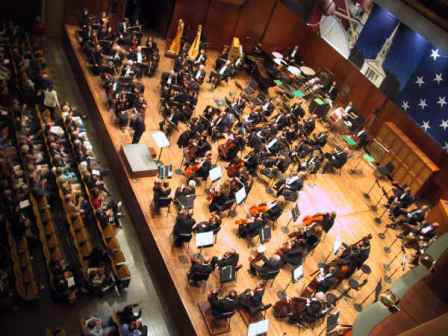 Maybe the orchestras will be next....
Maybe the orchestras will be next....
The big news here is that Gates, as many people already knew, will be moving away from its focus on the creation of small schools. It will be interesting to see what happens to the small school movement, particularly those districts that are in the middle or early stages of development.
Here is an excerpt from Liz Green's piece from Gotham Schools. You can view her entire report here.
The plan will transform the foundation's education work from expensive but quiet investments that focus on a relatively small set of schools to higher-profile advocacy work that keeps up the investments in individual schools but also touches on several political hot buttons.
Among the projects the foundation will tackle: a $500 million investment in experimenting with performance-based teacher pay systems; another $500 million toward creating data systems like the ARIS warehouse in New York City; ramped-up advocacy work pushing for national standards; and a research effort to create a national test that would be distributed to states and school districts across the country, free of charge.
So, what does this mean for arts education? On the surface of it, not much. I guess if the arts are part of the national standards and accompanying national test, that might be a doorway, but that's tricky, very tricky.
You can view the Seattle Times's piece here. The Atlanta Journal Constitution has a slightly different take.
More to come on this. Of course, there is no one who sounded the bell for national standards and curriculum more than Diane Ravitch. It will be interesting to see what she has to say.
More to come on this, I am sure.
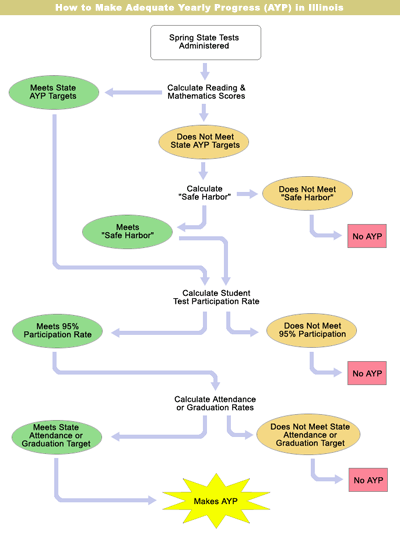 My colleague said to me that "the arts are a core subject in NCLB and that alerting policy makers of this can have a powerful positive affect."
My colleague said to me that "the arts are a core subject in NCLB and that alerting policy makers of this can have a powerful positive affect."It's true, NCLB does include arts education as one of the 10 core subjects.
In reality that's a policy fantasy. "Follow the money," said another colleague. Or, "the only accountability is financial accountability," said a senior education administrator. I like that last quote. It rings true to me.
So, what's happened under NCLB? Perhaps the best take on this is from Jack Jennings at the Center on Education Policy: the narrowing of the curriculum is real.
If the curriculum was narrowing during a period of budget growth in most public schools, what do you think will happen if NCLB remains the same or has only minor changes during a period of divestment in education?
In other words, what does NCLB plus big budget cuts equal: a new, hyper-driven back-to-basics movement. Less money will be available to schools, requiring cuts to staff, supplies, funding for external providers, etc. In combination with strict accountability that excludes arts education, these cuts are going to make arts even more vulnerable than ever before.
Will changes to NCLB make a difference? Naturally, it depends on the changes. Full funding of NCLB, as proposed by President Elect Obama isn't going to help arts education. Rethinking the accountability design would help, but that's a tough and uncertain road.
Diane Ravitch's column in today's Forbes.com is a good read if you want to know a bit more about how NCLB doesn't add up and what might be done about it.
 I thought about it yesterday, what music did I want to listen to, as I was sitting on the train thinking about the election. This morning, I turned to Aaron Copland and his Appalachian Spring, created in 1944 for Martha Graham, with an original set by Noguchi.
I thought about it yesterday, what music did I want to listen to, as I was sitting on the train thinking about the election. This morning, I turned to Aaron Copland and his Appalachian Spring, created in 1944 for Martha Graham, with an original set by Noguchi.It seemed just right for the moment. Our composer from Brooklyn, a gay man who was a true progressive democrat, who worked to make the world a better place for his fellow artists, creating organizations and opportunity, fighting for the rights of artists, while arguing that classical music is and can be created by Americans. His better known works capture an iconic American sound: uplifting, of light and of darkness; anthem-like, while challenging in its own way.
A perfect soundtrack to the promise so many of us feel with the election of Barack Obama as our next president.
It could have been Bruce Springsteen, Woody Guthrie, Louis Armstrong, Randy Newman, Paul Simon, or so many others. Aaron Copland it is, for me, for this Obama/American moment.
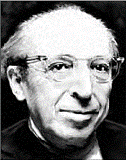
Click here for Leonard Bernstein conducting Aaron Copland's Appalachian Spring.
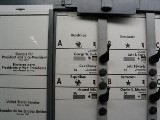 and then when done, you would move the handle from one side to the other, which required a bit of muscle, and then you heard a thump, the sound of the machine registering your vote.
and then when done, you would move the handle from one side to the other, which required a bit of muscle, and then you heard a thump, the sound of the machine registering your vote. And then, someone from the polling place would move the handle back to reset it, preparing the next person to vote.
And then, someone from the polling place would move the handle back to reset it, preparing the next person to vote.That's the sort of machine I used up until recently.
Okay, today, I get to the polling place, and the new fangled machine is broken. (It's a push button machine, that will make no sound.) So, what are they doing, they're handing out paper ballots, along with number two pencils, asking you to fill in a bubble next to your choice!?!
So, we go from older, working machines, to new, busted machines, to a paper ballot that oddly resembles a standardized test! That's progress. Not to mention the loss of the visceral feel of voting in that old machine.
If I lived in a state where the election appeared to be a real horse race I might have made a stink, after all, we were filling out our ballots in PENCIL!!!

